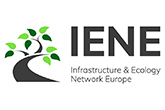IENE
Infrastructure and Ecology Network Europe
Although Transportation Infrastructure occupies only a small area, it affects all ecosystems through the development of new sources of pollution, isolation of populations or introduction of invasive alien species. Worldwide, 25 million kilometres of new roads are planned by 2050. In Western Europe, stakes are different. If infrastructures are no longer to grow, they must become opportunities for biodiversity. Because transportation infrastructure also has an ecological function. Verges, green or drainage areas, are all species habitats.
Making infrastructures more sustainable and safer for people and biodiversity is proving to be a major challenge, which Infrastructure and Ecology Network Europe (IENE) has proposed to address. Since 1996, IENE has enabled researchers, policy makers and practitioners to exchange and develop their knowledge to promote a safer and more environmentally sustainable pan-European transportation infrastructure.
The Foundation for Biodiversity Research, which hosts its executive secretariat, aims to:
- Coordinate the network, while providing scientific and technical support through its experience of science-policy interface on biodiversity
- Work with partners, networks of researchers and international socio-economic stakeholders to define and bring up research topics related to Biodiversity and Transportation Infrastructure
- Promote knowledge and best practices for biodiversity and make them available to stakeholders.
More information : http://www.iene.info/
The FRB, through its involvement in the IENE, is one of the 44 partners of the Bison project. It is in charge of “Work package 2”, whose missions are communication, dissemination and exploitation of results as well as strengthening partnerships. More information
